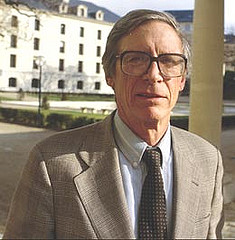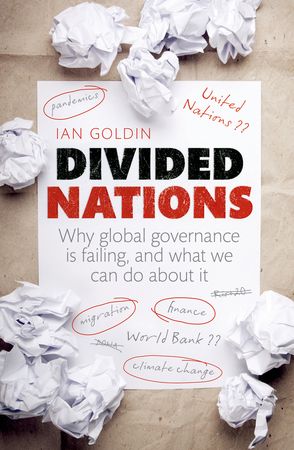
In terms of the financial crisis, there are fascinating links between the Rawlsian theory of justice and the economic liberal theory which has drawn criticsm for failing to predict the crash. For Rawlsian adepts: this is not an attempt to apply Rawls’ theory of justice to explain the current economic crisis. It would not be suited to do so and neither was it designed to do so. But highlighting these links may teach us a thing or two about both endeavours and also give us pause about the Rawlsian project itself.
Much (too much?) has been written about Rawls, both in defense of his project and against it. Those in disagreement generally use one of two strategies: attack the internal validity of his theory – questioning the evidence of the particular principles it seeks to justify – or externally, regarding the extent to which the method and theory relate to and are applicable in reality. Interestingly, these criticisms generally remain within the domain of philosophical critique: remarkably few writers have tried to understand the genesis of Rawlsian theory within its wider academic context.
This is odd, since at closer inspection the Rawlsian project looks remarkably similar both in scope and in method to some of the ambitions of mainstream economics. Now that the latter have come under attack, we can ask how it might affect Rawls’ theory.
Let’s first give a very brief sketch of some of the main preoccupations of post-war liberal economic theory, which sought to understand the actual behaviour of economic agents under conditions of scarcity through the creation of predictive models. These models used basic, stylised assumptions about individual behaviour. One of these was the rationality of the actors involved; another was the assumption of informed self-interest (which entailed rational preference formulation); and additionally, these models sought to understand economics through the interaction of individuals in market conditions. In other words, they take the individual as a starting point for analysis: economics is the result of aggregate individual activity. We might add to this the implicit assumption of consensus: buyers and sellers consensually engage in their transactions, and in theory, these rules apply universally to economic agents. Though this type of theory had been in development from WWII onwards, it particularly blossomed in combination with new developments in quantitative theory which emerged in the early seventies and suggested further methdological scrutiny and empirical precision.
But in the wake of the crisis, this type of economic theory (though certainly not all economic theory) has come under severe scrutiny. First, its models did not live up to aspirations, failing to predict the crisis. Second, it did not provide an adequate description of the causes of the crisis; or in other words, its assumptions seemed flawed. Generally, critics argue that this type of theory is overly static, as well as prone to equilibrium, whereas actual economic behavior is dynamic. Behaviour and preferences may change over time as circumstances change, and markets notoriously do not always generate equilibrium – as the recent financial crisis has (again!) illustrated.
Enter Rawls. Rawls’ theory follows a very similar trajectory: after years of revision it gets published in the early seventies. Moreover, it closely mirrors the theoretical approaches in economics: it is a model which utilises relatively basic assumptions about human behaviour in a stylised choice setting in order to draw conclusions about individual preferences. Whereas economics seeks to understand economic preferences, Rawls’ framework seeks to arrive at normative preferences. It does so through: a) the basic assumption of rationality; b) of self-motivated individuals; c) in a choice situation involving consensus seeking individuals; to d) arrive at generally agreeable conditions of communal life. Rawls’ actors share all the characteristics of the above outlined homo economicus.
Like economic society in liberal economic, theory Rawls’ theory reasons from individuals-to-community and through a relatively basic method of consenual choice, utilizing transparant and universally applicable rules of individual rationality. Even its distinguishing hallmark – the lack of information (the veil of ignorance) – in fact highlights the correspondence between the two approaches. Similar to economic theory, information does most of the theoretical work. However, in this case, it is the uniformal lack thereof which underlines the basic reasoning of the individual participants.
In this reading, justice thus becomes the result (‘contract’) of a consensus between individual rational actors engaging in a ‘one shot’ game (in the market of ideas) which serves to establish an equilibrium. This equilibrium is in itself definitive. As such it seems to fall prey to the criticisms levelled at its economic theory siblings. Rawls’ account too seems static and prone to equilibrium, whereas like conditions in economics, the demands of justice may change over time and are subject to the unpredictable dynamics of the political realm.
But these are still matters of methodology. This brief exposition should lead us to a more fundamental question. Modern mainstream economic theory argues from so-called ‘universal’ principles, to arrive at universally ‘valid’ conclusions. Exactly because they are universally valid, these conclusions, in effect, decontested the realm of economic interaction because they were the result of ‘consenual action’. These assumptions are now problematic. Similarly, Rawls sought to arrive at similar universally ‘valid’ principles through similar universal principles. In doing so, however, he decontested what justice entails.
To what extent can a theory of justice which is so similar in nature to economic theory actually provide us with meaningful insight into the demands of ‘justice of the marketplace’? If the crisis has shown one thing, it is that these are far from static and definitely not in equilibrium.
Rutger Kaput is a Dphil student in Politics at the University of Oxford (Political Theory). His research focuses on the question to what extent political order is destabilised by processes of modern social acceleration.







No Comment